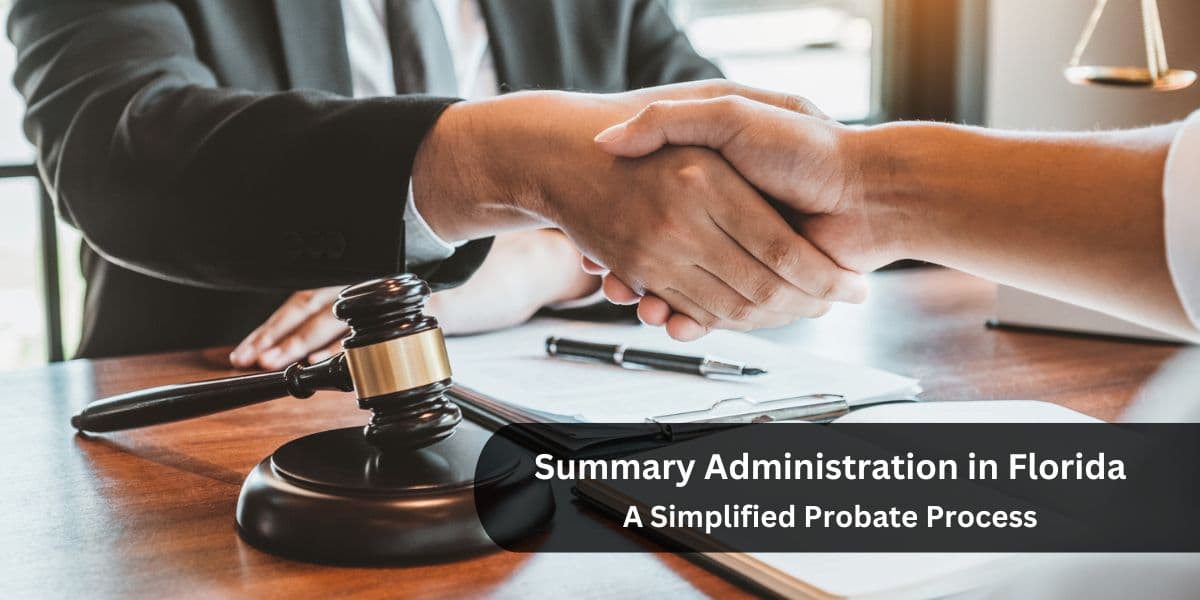
Simplify Probate: Summary Administration Florida Explained
Navigating the management of a probate estate can be incredibly complex. Formal Administrations in Florida can last 8-12 months, if not longer depending upon the facts of the case. That’s whereSummary Administrations Floridacomes into play.
Florida summary administration probate proceedings offer a streamlined process for administrable cases in Florida – specifically, small estates with no creditors or those estates where the decedent died more than two years ago, which effectively bars claims from creditors.
This Special estate planning tool usually takes less money, time, and effort than formal administrations.
While summary probate typically lasts 1-4 months, formal administrations can take up to 12 months. This expedited Florida probate approach not only simplifies the legal proceedings but also significantly shortens the timeline for asset distribution among beneficiaries.
- Summary administration is a simplified probate process for small estates valued at less than $75,000.00.
- It is also available if the deceased passed away more than two years ago barring any creditor's claims.
- This type of small estate administration lasts 1-2 months making it faster and less complex.
- The process begins with petition filing in the court followed by Court Review, florida court certified order of summary administration, Estate Closure, and finally asset distribution to the rightful beneficiaries.
- Certain factors that determine the timeline of this simplified administration are The Judge’s docket, asset type in the estate, and total number of heirs and beneficiaries, etc...
- To know whether your estate is eligible for Florida summary administration, consult a Florida probate administration lawyer.
Summary Administration Florida is available under two primary conditions:
- If the estate's total value of unexempt assets is less than $75,000.00.
- If the decedent has been deceased for more than two years.
Certain assets are “exempt” or protected from claims of creditors and do not count towards the $75,000.00 threshold. Examples of exempt assets include the decedent’s homestead property, household furniture, appliances, and up to two motor vehicles.
Learn More About:
What assets are exempt from probate in Florida?
Where a decedent passed away more than two years ago, creditor claims are barred, meaning creditors cannot claim the estate.
Where an estate is not indebted or claims are barred, the probate process in Florida becomes much less complex. It takes much less time, facilitating a more straightforward transfer of assets to their beneficiaries.
Additionally, summary administration can still be pursued if the decedent was not a full-time resident of Florida. This flexibility makes summary administration the best option for many families seeking to settle estates with minimal legal hurdles and expenses.
Summary Administration A Road Map Ahead:
- Petition filing: Florida summary administration begins with filling a petition for summary administration in Florida. A beneficiary or named personal representative submits a petition for summary administration detailing the estate information, beneficiaries, assets, debts, and distribution plan.
- Court review: The court evaluates the petition filed.
- Entry of order: The court may approve or deny a Petition for Summary Administration and enter an Order as appropriate. If the Petition is approved, a Florida Order of Summary Administration is entered. This final order should list all assets along with the beneficiaries and specify how the assets are to be distributed according to the decedent’s will or Florida’s intestacy statute.
- Estate closure: The court concludes the estate proceedings and releases any necessary bond.
- Asset distribution: The florida court-certified order of summary administration is presented to the institution holding the assets and the funds are released under the Order. This last step confirms the legal transfer of the estate’s assets to the rightful andqualified beneficiaries,effectively concluding the summary administration process.
For those navigating these processes, it's advisable to consult a probate attorney, especially considering that attorney fees can vary based on the estate's complexity and the agreement among beneficiaries.
Is it wise to choose summary administration in case of multiple creditors:
- While choosing Florida summary administration probate it is important to consider the presence of creditors.
- If the decedent had numerous creditors, opting for Summary Administration might be less advantageous.
- In such cases, if a creditor files a claim, the court might require the estate to undergo a formal administration process instead, which is more detailed and time-consuming.
- This aspect must be carefully evaluated when deciding whether Summary Administration is the appropriate route for settling an estate.
How long does Summary Administration take in Florida
Summary administration in Florida is renowned for its efficiency, typically concluding within a relatively short period compared to formal administration processes. The timeline for Florida summary administration can take 1-4 months to complete, depending upon the Judge’s docket and other relevant factors such as the estate's nature and complexity.
Several factors determine the timeline of the Summary Administration Florida :
- The Judge’s docket.
- The type of assets in the estate.
- The amount of time since the death of the decedent.
- The quantity of assets and heirs or beneficiaries.
- Whether any claims by creditors are filed.
- Whether the petitioner publishes the optional three (3) month creditor publication period.
Useful Resources:
- When and How often should you review your estate plan?
- How do you claim deceased bank accounts without probate?
What Our Attorney Says
Frequently Asked Questions:
What is the process for summary administration in Florida?
In Florida, summary administration is a streamlined probate process in which a personal representative is not required. This process applies when there are no assets requiring administration and there are no creditors to settle debts. The court directly distributes the estate's assets according to the will or Florida's intestacy laws.Is it necessary to hire a lawyer for summary administration in Florida?
No, it is not always mandatory to hire an attorney for summary administration in Florida. A person interested in this process can file the necessary paperwork directly with the court without legal representation. But it is always advisable to consult a probate lawyer before DIY, as some situations may require the consultation of an experienced lawyer such as multiple numbers of heirs and beneficiaries.What are the typical legal fees for summary administration in Florida?
Legal fees for Florida summary administration typically range from $1,500 to $3,500. Costs vary depending on the complexity of the estate, such as the nature of the estate, the presence of creditor claims, the number of beneficiaries, and the process involved in getting the last will and testament accepted in probate court.Which assets are exempt from probate in Florida?
In Florida, several types of assets bypass the probate process, including:- Assets held in revocable trusts.
- Assets that designate beneficiaries (such as life insurance policies).
- Jointly held accounts.
- Property owned as tenancy by the entireties.
- Homestead properties.
- Assets within the decedent's primary residence.
- Funds in tuition programs.
- Vehicles.
Conclusion:
We hope this article provides clarity when considering a small estate administration in Florida. These administrations provide a streamlined alternative where appropriate based on the facts of the case. If you aren’t sure whether your Florida-based loved one’s administration is eligible for a summary administration, call our office today to schedule your complimentary consultation with one of ourflorida probate administration lawyers.

